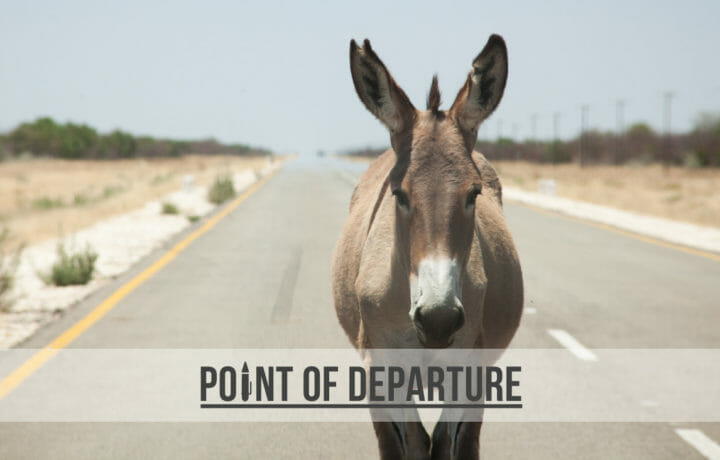“The intellectual may be respected, but he is never admired; he is tolerated, but he is never trusted.” – Richard Hofstadter
As I was walking with the battalion commander across the parade field, it was hard to miss the GP Medium tent under the camouflage netting. People were milling about outside the entrance – a couple of them in an animated discussion while another stood to the side casually smoking a cigarette.
“What’s going on there?” I asked.
“The XO is leading them in MDMP training,” he responded.
The Military Decision-Making Process, or MDMP, is the Army’s long-standing planning methodology. As a recent graduate of the School of Advanced Military Studies (SAMS) and coming of 15 months as a division war planner, I had lived and breathed the process for the better part of three years. I’d even planned an invasion that was less than a year away. “I’d be happy to help out,” I offered.
He sighed, looking at me with an expression that bordered somewhere between pity and contempt. “I don’t want you getting any SAMS stink on the staff.”
A Beautiful Mind
That wasn’t the first time I encountered a form of anti-intellectualism, nor would it be the last. As the nerdy little kid who read fast and was a year ahead in math, I learned early on that intellectualism could generate some unwanted attention. So, I maintained a healthy dose of humility, became adept at disguising it from my peers, and did my best to maintain a low profile.
But there were always moments like this.
In his Pulitzer Prize-winning 1963 book, Anti-intellectualism in American Life, author and historian Richard Hofstadter defines the concept as “a resentment and suspicion of the life of the mind and of those who are considered to represent it; and a disposition to constantly minimize the value of that life.” In the book, Hofstadter traces how skepticism toward intellectualism – defined as critical thought, reflection, and expertise – became embedded in American culture. He argues that anti-intellectualism stems from historical patterns shaped by populism, evangelical religion, and a pragmatic national identity that prizes “common sense” over theoretical knowledge.
But let’s be honest. Common sense really isn’t all that common. And most of the people advocating for common sense with a harsh disdain for a sharp mind lack both.
Dumb and Dumber
Hofstadter warns that anti-intellectualism poses a significant risk to informed decision-making in modern society. Anti-intellectualism is a metaphorical coin. One side captures a distrust of “a distrust of intellect, intellectuals, and intellectual pursuits,” the other a rejection of education, science, and critical thinking. When expertise is devalued, public discourse becomes vulnerable to demagoguery, oversimplification, and emotional appeals. Critical thinking falls by the wayside, and we wander ever closer to transforming Idiocracy into a documentary.
The rise of populism and the decline of critical thinking tend to go hand in glove – one inevitably comes with the other. But that’s hardly the only reason. The explosion of social media gave rise to “influencers” whose baseless opinions shaped perceptions for the worse. The decay of reasoned debate has been well documented. And the education system seems to struggle with teaching a skill that many teachers don’t possess themselves.
That creates an environment ripe for anti-intellectualism. Without the critical thinking skills to reason through the torrent of nonsense, people are – as Hofstadter warned – vulnerable to specious claims and arguments. That Hofstadter – who witnessed the anti-intellectual surge during the height of McCarthyism – could have essentially predicted today’s dilemma is remarkably prescient.
Dangerous Minds
But all hope is not lost. Although Hofstadter didn’t prescribe a rigid, blow-by-blow counter punch to anti-intellectualism, he did outline the attitudes and systemic changes that could return society to a sense of normalcy. He believed that democratic values had to find a delicate balance with intellectual pursuits; that balance, once restored, would constitute the reset so critical to reducing the tensions between populism and expertise.
Elevate education.
Hofstadter believed an overemphasis on vocational and utilitarian goals in education fueled anti-intellectualism. He advocated for education that fostered curiosity, critical thinking, and appreciation for knowledge as a cultural good, not merely a job skill.
Strengthen intellectual leadership.
He argued that intellectuals needed to engage with the public, rather than retreat into academic isolation. This meant writing accessibly, participating in civic life, and bridging the gap between scholarly pursuits and day-to-day concerns.
Value the mind.
Hofstadter believed that we needed to revive respect for ideas, reflection, and debate. This required not just schooling, but media and institutions that reward depth and informed discourse rather than sensationalism or simplicity.
Balance democracy and expertise.
He saw the rise of anti-intellectualism at least in part as a reaction to perceived elitism. His solution was to integrate expertise into democratic processes without undermining equality – creating trust through transparency, accountability, and humility among experts.
This all begins with education. We have to emphasize critical thinking and intellectual curiosity, not just the accumulation of knowledge. We have to be willing to engage in the classroom and at home, challenging the next generation to, as comedian George Carlin once said, “question everything.” We don’t have to embrace Idiocracy. We have a choice.




